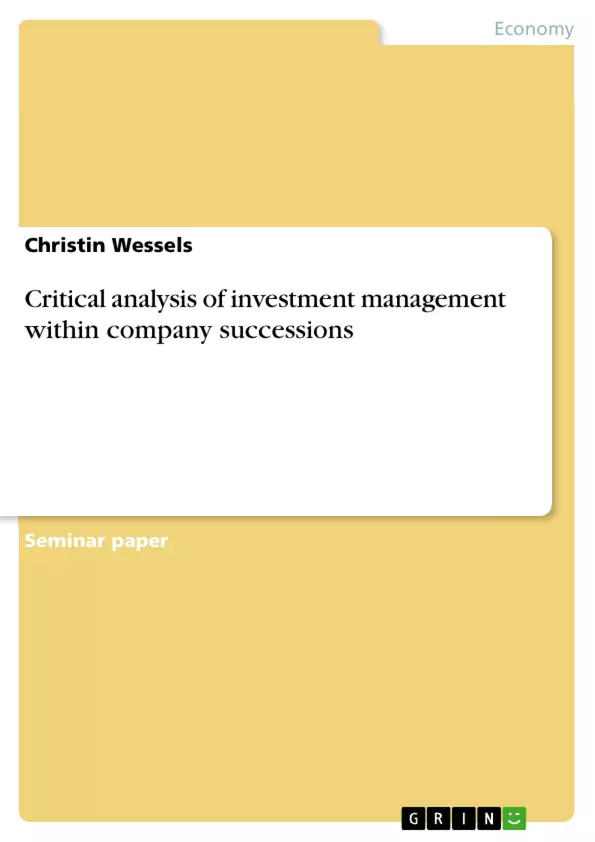Company successions are an important theme for the economy. The amount of enterprises, which search for a successor, increased in the last years. Especially small and medium-sized enterprises are affected by this issue. In this case the issue arises, that no internal successor is available. That’s why external opportunities have to be considered.
Among options like foundations or management buy-outs, private equity investors are one possibility of a successor. These investors bring new equity and know how into the enterprise. On the other side, private equity firms often invest only for a defined period and focus on the return on investments. That’s why private equity firms mention in the sales contract specific rights and agreements. These rights include e.g., that other shareholder have to sell their shares, if the private equity firm wants to sell its shares. Furthermore, if the private equity firm wants to go public, the other shareholders must agree. If these rights are reflected in the sales contract, the private equity firm has the total power over the enterprise. That’s why especially in the contract phase the current entrepreneur should be alerted, what agreements are reflected in the contract. Otherwise the PE firm holds sway over the whole company. After the defined time horizon, the private equity firm leaves the enterprise. For this different exit strategies exist: An Initial public offering, a trade sale, a secondary sale or a buy back. The most interesting one for the investor is to go public, followed by a trade sale. Going public means a high return on investments for the investor.
All in all, the entrepreneur holds the strings: He can influence the future of the company, because he chooses the successor for the enterprise. If he reflects, what the enterprise needs and gets the motivation of the investor, why he wants to buy the enterprise, he can choose the right successor for his company.
Inhaltsverzeichnis (Table of Contents)
- Executive Summary
- List of Figures
- List of Abbreviations
- 1. Introduction
- 2. Company successions - background and theory
- 2.1 Defining company successions
- 2.2 Types of company successions
- 3. Private equity as an opportunity of financing
- 3.1 Defining private equity
- 3.2 Investment process of private equity firms
- 3.2.1 Planning phase
- 3.2.2 Due Diligence
- 3.2.3 Sales contract
- 3.3 Exit strategies
- 3.3.1 Trade sale
- 3.3.2 Secondary sale
- 3.3.3 Buy back
- 3.3.4 Initial Public Offering
- 4. Opportunities & Threats of private equity firms investing in SMEs
- 5. Conclusion
- References
- ITM Checklist
Zielsetzung und Themenschwerpunkte (Objectives and Key Themes)
This assignment critically analyzes the role of investment management within company successions, particularly focusing on the involvement of private equity firms in the process. The objective is to understand the intricacies of private equity investments in small and medium-sized enterprises (SMEs), including their investment strategies, contractual agreements, and exit strategies.
- Company successions and their impact on the economy
- The role of private equity firms in company successions
- The investment process and strategies of private equity firms
- Contractual agreements and the power dynamics between private equity firms and SMEs
- Exit strategies employed by private equity firms
Zusammenfassung der Kapitel (Chapter Summaries)
- Chapter 1: Introduction: This chapter sets the stage for the analysis by introducing the importance of company successions and highlighting the increasing need for successors, especially in SMEs.
- Chapter 2: Company successions - background and theory: This chapter delves into the definition and types of company successions, providing a theoretical framework for understanding the phenomenon.
- Chapter 3: Private equity as an opportunity of financing: This chapter focuses on private equity firms as potential successors for companies, exploring their investment process, contractual agreements, and exit strategies.
- Chapter 4: Opportunities & Threats of private equity firms investing in SMEs: This chapter examines the potential benefits and drawbacks of private equity involvement in SMEs, discussing the challenges and opportunities presented by such investments.
Schlüsselwörter (Keywords)
The key themes of this analysis encompass company successions, private equity, investment management, SME financing, contract negotiations, and exit strategies. The discussion focuses on the interplay between private equity investors, SMEs, and the complexities of managing investments during company successions.
Frequently Asked Questions
Why is private equity a viable option for company succession?
Private equity investors provide fresh capital and professional management expertise, which is especially useful for small and medium-sized enterprises (SMEs) lacking internal successors.
What are common exit strategies for private equity firms?
The main exit strategies include an Initial Public Offering (IPO), a trade sale to another company, a secondary sale to another investor, or a buy-back by the original owners.
What risks should entrepreneurs consider when selling to a PE firm?
Entrepreneurs should be aware of contractual clauses that grant the PE firm total control, such as drag-along rights or forced agreements on future public offerings.
What role does Due Diligence play in the investment process?
Due Diligence is a comprehensive analysis of the company's financial, legal, and operational status to identify risks before the final sales contract is signed.
How can an entrepreneur influence the future of the company after succession?
The entrepreneur holds the power by carefully choosing the right successor and understanding the investor's motivation and the specific terms of the sales contract.
- Citation du texte
- Christin Wessels (Auteur), 2017, Critical analysis of investment management within company successions, Munich, GRIN Verlag, https://www.grin.com/document/359272



